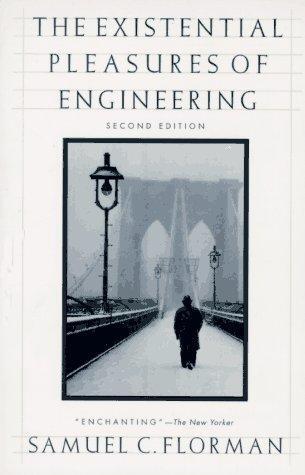The existential pleasures of engineering
As Florman mentiones in the beginning of this book it is not about existentialism in the sense of depressive European philosophy but rather about the existence and life of enigneers as professionals.
It is about development, technology, progress and the voices against these things. It’s about the present as well as the romatic relationship some have with the “more natural” human past.
Part 1
This part sketches out a brief history of engineering and development and uses this to talk about engineering moral and ethics. Florman poses that imposing a singular and monolithic code of ethics on the entire profession is nonsensical and even dangerous.
He then intertwines this with the current—and on-going even at that time— environmental crisis and kind of absolves engineers of their direct responsability.
The claim is that it is primarly a flaw in our democracies and societies that has led us astray, and that what needs fixing is not faulty “engineering morals” but rather faulty goals and incentives in society.s
He rather insists that some engineers and technoloigsts leave their posts as schemers, planners and builders and venture into the realms of politics, business and economy to use their already good sense of ethics, aquired analytical and problem solving skills to lead and guide humanity.
Part 2
In this part the central topic is the antitechnologial movement, the romatisation of an arcadian natural human past and the demonisation of technology.
Florman also spends considerable time refuting the antitechnological movement’s arguments. A lot of his arguments are of the same type as those he claims faulty in his oponent. He cherry picks many examples from central antitechnological authors’ writing and goes on an on about the claims they make and how they don’t make sense.
This was the part I liked the least however informative as it is.
Part 3
The last part of the book is dedicated to how one might go about re-crafting a existential philosophy of engineering given all the faults noted in the first two parts.
Here he addresses points taken from the first two parts and tries to use litterature, examples from culture and real-life situations to point to possibilities for a new belief system for engineers.
Anti materialist:
- Greek philosophy
- New Testament
Materialist:
- Homer’s works
- Old testament
Postscript
Four additional essays by the author
Small is dubious
Regarding E. F. Schumacher’s book Small Is Beautiful
Also of note is the following documentary on Schumacher Small Is Beautiful: Impressions of Fritz Schumacher
